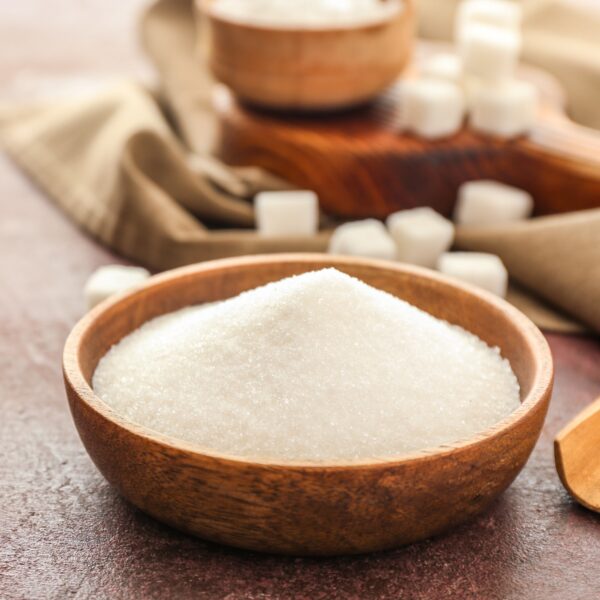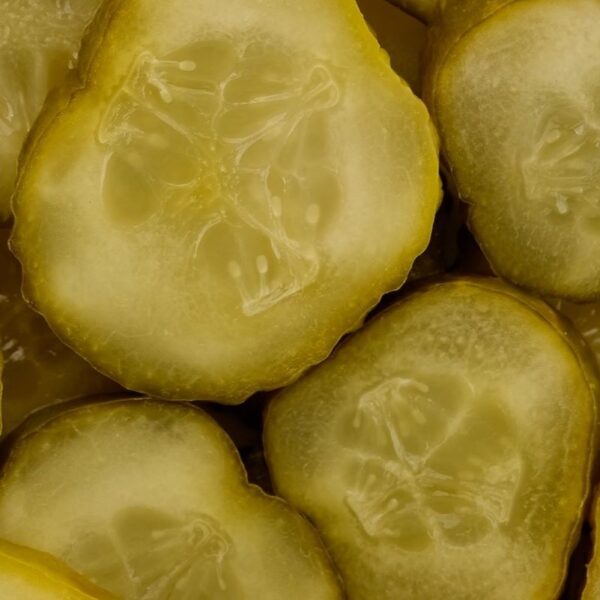Cannabidiol (CBD) has gained attention in the food and supplement industries due to its antioxidant and anti-inflammatory properties, immunomodulatory effects, and potential health benefits. Hemp-derived CBD isolate can also be used as an ingredient in functional foods, a booming market.
CBD is the primary non-psychotropic cannabinoid in cannabis and hemp (Cannabis Sativa). CBD isolate is a purified form (~99%) of cannabidiol, from which all other hemp plant compounds are removed.
What is CBD Isolate?
CBD isolate is a terpenophenolic compound containing twenty-one carbon atoms, with the formula C21H30O2. It is predominantly present in its acid form as cannabidiolic acid in hemp. CBD is non-psychoactive, meaning it does not produce the “high” associated with marijuana use, generally attributed to delta-9-tetrahydrocannabinol (THC).

CBD isolate chemical structure. Source: Wikipedia
The preparation of CBD isolate involves multiple steps, including extraction, winterization, decarboxylation, distillation, and crystallization. The isolated crystal is subsequently processed into a white powder. CBD isolate is free of phospholipids and terpenes.
Product Examples
CBD isolate can be added to edibles or consumed in various formats as follows:
| Type | Examples |
| Foods | CBD-infused Gummies, Confectionery, and Chocolates |
| Supplements/Medicinal | CBD Tinctures, CBD Oil, Topicals, Lotions |
| Beverages | CBD-infused Beverages (Alcoholic & Non-alcoholic) |
Properties of CBD Isolate
| Molecular Weight | 314.47 g/mol |
| Storage Conditions | 25°C/60% RH in dark |
| Solubility in Water | 12.6 mg/L |
| Physical Form | Crystalline Powder/ Liquid |
| Melting Point | 67.5°C |
| Vapor Pressure | 3.20×10−5 Pa |
| Appearance | Crystalline powder |
Sensory Attributes
CBD isolate is a white powder or refined crystal. Terpenes give the hemp plant a distinguished taste and smell. Terpenes are not present in CBD isolate, eliminating the traditional smell and taste of cannabis.
Biological Activity
A group of lipid mediators called endocannabinoids form an endogenous signaling pathway in health and disease. They vary across disease states as an inherent response to physiologic stress and as a marker of disease severity. The endocannabinoid system (ECS) is a biological system composed of endocannabinoids, the cannabinoid receptors CB1 and CB2, and a few enzymes. Various studies have supported the role of ECS in multiple bodily functions and processes as follows:
- Maintenance of homeostasis
- Regulation of gastrointestinal function
- Line of defense against bacteria
- Caloric energy balance
- Immune function
- Pain management
- Stress reactivity and sleep
Cannabidiol compounds are high-affinity agonists for both CB1 and CB2 receptors. However, the mechanisms and actions of the ECS involved in the therapeutic effects of endocannabinoid (cannabidiol and other compounds) are not entirely elucidated and remain a focus area for research.
Typical Formulations
CBD Nanoemulsion
The low water solubility of CBD affects its absorption into the body. A novel CBD nanoemulsion was prepared to improve its poor solubility and absorption. The formulation is as follows.
| Ingredients | Phase volume, w/w% |
| Vitamin E | 1.7 |
| Ethanol | 3.8 |
| Tween-20 | 70 |
| Water | 24.5 |
| CBD | 30 mg/ml |
The nanoemulsion formulation solubilized CBD in water to form a self-emulsifying system. It also improved the bioavailability in rats by ~65%.
CBD Infused Energy Drink
A carbonated drink was infused with cannabidiol with the final concentration at 50 mg/l to 100 mg/l of CBD. A CBD emulsion was made with 20% (w/w) of CBD in polysorbate 20. This emulsion was added to the carbonated drink and subjected to an ultrasonic or heated water bath to obtain the final beverage.
CBD Isolate Formulation Considerations
CBD is thermally unstable and very sensitive to photolytic reactions and oxidation. CBD powder is significantly more stable than CBD in oil solution.
| Attribute | Stability |
| Light | Sensitive |
| Heat | ThermolabileUnstable in higher pH, even at 37°C (Degradation temperature 140°C) |
| Oxidative | Sensitive to oxidation |
| pH | Stable between pH 4 and 6 |
Unlike full-spectrum CBD and broad-spectrum CBD distillate, which have low levels of multiple cannabinoids in addition to CBD, CBD isolate is a single-molecule material that may share many of the same benefits. CBD isolate is the purest form of cannabidiol. At the same time, distillate is an extract that contains around 75-85% cannabidiol as well as other cannabinoids such as cannabigerol (CBG), cannabinol (CBN), and tetrahydrocannabinol (THC).
Terpenes are also present in CBD distillate, which gives the hemp plant a distinguished taste and smell depending on the strain of Cannabis Sativa used to begin the extraction process. The physical appearance of isolate and distillate also differ.
Infusing CBD into Water-Based Formulations
The process of infusing CBD into water-based food and beverage products requires the addition of an emulsifier. Infusion into oil-based food systems is more straightforward. Cannabidiol is present in hemp seed oil, which can be consumed as a supplement. CBD isolate is helpful for those seeking the most concentrated form of CBD without psychoactive effects.
Administration of CBD Isolate
The more commonly used routes of administration are inhalation and oral. However, CBD shows poor oral bioavailability (around 6%). Cytochrome P450 (CYP450) enzymes mainly metabolize it. Due to its low solubility in water, the absorption from the gastrointestinal tract is erratic, and the resulting pharmacokinetic profile is variable. One way to increase oral bioavailability up to 16–20% is to administer CBD concomitantly with food containing a high lipid content.
According to the pharmacokinetic studies of Epidiolex®, a 100 mg/ml oral solution, CBD reaches the maximum blood concentration between 2.5–5 hours. The absorption of CBD following inhalation is higher, around 31%, and peaking in plasma within 3–10 min.
CBD Isolate Safety & Regulatory Concerns
Because CBD is from the family of cannabinoids, it poses multiple challenges to its use in food and supplements.
Side Effects
THC and CBD have similar chemical structures but differ dramatically in their mechanisms of action and effects on brain functions.. However, increased impairment and mental health incidents are associated with acute and chronic THC use. Additionally, CBD interactions with CYP450 enzymes and drug efflux transporters may have serious consequences when co-administered with other drugs.
Controversies
The use of cannabinoids for recreational purposes as a psychoactive substance and the treatment of diseases is a controversial topic, with many different points of view. However, the scientific community’s thorough research has made cannabis use increasingly socially acceptable, with cannabis products and derivatives marketed globally.
Misconceptions and Lack of Knowledge
Cannabis has traditionally been associated with illicit “drugs” in many parts of the world, and the word “CBD” is still unfamiliar. For this reason, educating consumers about CBD’s health benefits, safety, and distinction from “drugs” is crucial, as legal regulations have been updated worldwide to reflect this understanding.
Legalities
Legal jurisdictions focus primarily on warnings and prohibiting health claims related to the treatment or cure of any diseases. However, the labeling requirements need to be more consistent. More concerning is the absence of standards for CBD dosage and purity testing.
Technological Challenges
CBD is a highly non-polar molecule with low aqueous solubility and low oral bioavailability. This limits and poses difficulties in using CBD isolate in water-based systems. Moreover, CBD has relatively poor stability, which is affected by various factors such as temperature, humidity, pH, oxygen, light, solvent types, etc.
FDA Information
The Agriculture Improvement Act of 2018 (2018 Farm Bill) removed hemp and hemp seed from the controlled substances classification. A new category of cannabis classified as “hemp” was established, defining it as cannabis and cannabis derivatives with <0.3% delta-9-tetrahydrocannabinol (THC). However, the FDA still holds the oversight authority of cannabis products. The FDA has issued warnings to several companies giving unsubstantiated claims related to treating or curing diseases on CBD products.
Legality in the U.S.
Adding CBD to food products is illegal at the U.S. federal level but legal in some states. The CBD-infused food product market has grown substantially due to state legalization. Some states have legalized CBD use and established regulations for selling cannabis extracts, including THC- and CBD-infused food products. The regulatory status of THC and CBD in each state in the USA can be found here.
The use of CBD in food has varying legal statuses in different states in the U.S. It ranges from illegal in any form (e.g. Massachusetts) to legal in foods and dietary supplements (e.g. Colorado). CBD-containing foods have some restrictions, such as being sold only through licensed dispensaries in some states. Most states’ legal jurisdictions prohibit health-related claims for CBD products, which is enforced at the federal level.
Canadian Information
In Canada, cannabis is nationally legalized, but phytocannabinoids are on the Prescription Drug List and cannot be legally sold in self-care natural health products (NHP) or cosmetics. CBD food products in Canada are heavily regulated, and a federal license is required for production, distribution, and sales.
EU Information
The United Kingdom and the European Union (EU) are working to classify CBD food products as “novel foods” and require preauthorization for such products to be introduced or remain on the market. The application process requires a comprehensive risk assessment to include the abovementioned issues.
Asian Regulatory Information
FSSAI, the regulatory body of India, regulates the use of hemp seed products in food. According to the regulation, cannabinoids in hemp seed or seed products must only be present naturally in or on the seeds not exceeding 75 mg/kg, and THC content must not be higher than 5 mg/kg. Foods containing hemp seed are restricted from any health claims related to cannabinoids.
In Japan, products containing CBD extracted and manufactured from only the mature stems and seeds of the cannabis plant do not fall under the legal category of cannabis, which is regulated by law. Imported products containing CBD have to be THC-free.
Identification Numbers
| CAS Number | 13956-29-1 |
| EC Number | 689-176-3 |
Health Effects of CBD Isolate
Cannabidiol has been reported to display various biological effects in humans and animals.
Pain Management
Cannabidiol has been reported to show analgesic and antihyperalgesic effects, producing pain-blocking effects in animal models of neuropathic pain. Additionally, it has been shown to inhibit paclitaxel-induced neuropathic pain without diminishing nervous system function or chemotherapy efficacy in mice.
Antioxidant
CBD has potential antioxidant properties because its free cationic radicals exhibit several resonance structures. It can regulate the state of redox directly by affecting the components of the redox system and indirectly by interacting with other molecular targets associated with redox system components.
The direct antioxidant effects of CBD are as follows:
- Free radical chain reaction
- Transition metal ion chelation
- Reduction in pro-oxidant enzyme activity
- Activation of the redox-sensitive transcription factor
- Increasing the activity of superoxide dismutase
Indirectly, CBD may enhance the peroxisome proliferator-activated receptor alpha (PPAR-α) activated by endocannabinoids. It directly regulates the expression of antioxidant enzymes such as superoxide dismutase by interacting with their promoter regions.
Anti-inflammatory
Oxidative modifications play a role in regulating pathological conditions characterized by redox imbalances and inflammation. Also, CBD has demonstrated a clear anti-inflammatory effect in the lung by reducing the ability of bacterial lipopolysaccharide to induce neutrophil infiltration.
Immunomodulatory
CBD has a regulatory effect on the immune system by directly suppressing the activation of various immune cell types, induction of apoptosis, and promotion of regulatory cells, which control other immune cell targets.
Fun Facts About CBD Isolate
- It was isolated in 1940, and its structure was elucidated about two decades later by Raphael Mechoulam’s group.
- Hemp use dates back to 2700 B.C.
- CBD can be beneficial for animals too.
Additional Sources & Resources
- Food Processing – Cannabis: Will There Ever be a Pot of Gold?
- FDA – Statement from FDA Commissioner Scott Gottlieb, M.D., on new steps to advance agency’s continued evaluation of potential regulatory pathways for cannabis-containing and cannabis-derived products
- ScienceDirect – Extraction of cannabidiol (CBD) from hemp using aqueous sodium chloride ethanol solutions
- Federal Register – Establishment of a Domestic Hemp Production Program
- Abundant Labs – CBD Isolate vs. CBD Distillate
- NCBI – Cannabis and Cannabinoid Research – Cannabis and Cannabinoid Research Volume 2.1 2017
- BevSource – CBD Beverage Breakthroughs Creating Opportunities 2023 and Beyond











